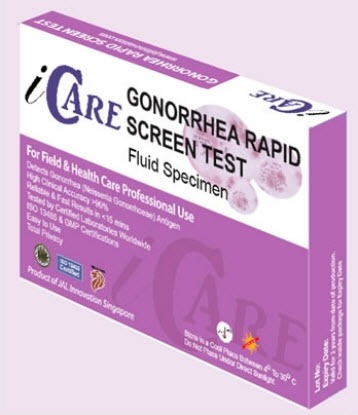Table of Contents
Gonorrhea, a common sexually transmitted infection (STI), remains a serious health concern in Cambodia. The country faces challenges in controlling the spread of gonorrhea, primarily due to a lack of awareness, stigma around sexual health and limited access to testing and treatment. Early detection and diagnosis are key to controlling the disease and preventing long-term complications. Gonorrhea test kits, are helping to address these issues by providing accessible and timely testing.
In this article, we will discuss the key risk factors that contribute to the spread of gonorrhea in Cambodia, common causes and how test kits play a crucial role in early diagnosis and treatment, particularly in cities such as Phnom Penh and Siem Reap, where healthcare access is improving but still poses challenges.
Common Causes of Gonorrhea in Cambodia
Understanding the causes of gonorrhea is the first step in preventing its spread. In Cambodia, several common risk factors contribute to the transmission of the infection.
Unprotected Sexual Contact
The most significant risk factor for gonorrhea transmission is unprotected sexual activity. In Cambodia, particularly in urban areas like Phnom Penh and Siem Reap, there is a growing trend of individuals engaging in unprotected sex. Young adults and individuals with multiple sexual partners are particularly vulnerable. Many people in these cities may lack adequate education about the importance of using protection, which increases the risk of contracting gonorrhea and other STIs.
Limited Access to Healthcare Services
While Phnom Penh and Siem Reap have better access to healthcare services, many rural areas in Cambodia still lack sufficient healthcare infrastructure. In these areas, people may not have access to gonorrhea diagnostics, making it difficult for individuals to get tested. This leads to undiagnosed infections, which continue to spread within communities. Moreover, the stigma around visiting clinics for STI testing prevents many from seeking help.

Lack of Education
In some parts of Cambodia, there is still a lack of comprehensive sexual health education, particularly in rural communities. Many people, especially young individuals, may not fully understand the risks of unprotected sex or the symptoms of gonorrhea. This lack of awareness contributes to a delay in seeking testing and treatment.
The Role of Gonorrhea Test Kits in Timely Diagnosis and Treatment
Gonorrhea Test Swabs and Blood Tests
Traditionally, gonorrhea is diagnosed through a gonorrhea test swab or a blood test. A swab sample is taken from the affected area, such as the cervix, urethra, throat or rectum and tested for the bacteria that cause the infection. Blood tests may also detect the antibodies produced in response to the infection. These tests are essential for identifying infections that are not visible through symptoms alone.
Gonorrhea Home Test Kits
For people in rural Cambodia or those who may be hesitant to visit a healthcare clinic due to stigma, gonorrhea home test kits provide a valuable alternative. These kits allow individuals to collect a sample at home and send it to a laboratory for testing. This method increases accessibility to testing and ensures that more people can get diagnosed and treated promptly.
Gonorrhea Rapid Tests
Gonorrhea rapid tests are another useful tool, especially in areas with limited healthcare resources. These tests can provide results in as little as 15 minutes, allowing for immediate diagnosis and treatment. Gonorrhea rapid tests are especially beneficial in high-risk populations, such as young people or sex workers, where timely intervention can prevent further spread of the infection.
Treating Gonorrhea in Cambodia
Gonorrhea is treatable with antibiotics, usually penicillin or other medications. When diagnosed early, the infection can be cured quickly, preventing complications and reducing the risk of transmission to others.
Medical Treatment in Healthcare Facilities
In cities like Phnom Penh, Siem Reap and Battambang, people who test positive for gonorrhea can access antibiotics at local healthcare facilities. These antibiotics effectively cure the infection and patients are encouraged to follow up with healthcare providers to ensure the infection has cleared. Additionally, sexual partners are often treated to prevent reinfection.
Access to Medications in Rural Areas
In more rural areas of Cambodia, access to antibiotics and treatment may be more limited. However, increasing access to rapid gonorrhea test kits and medications through pharmacies and mobile clinics is a step toward improving healthcare access. Outreach programs that provide education and treatment options in these areas are vital for controlling gonorrhea transmission.
Conclusion
The spread of gonorrhea in Cambodia is influenced by several factors, including unprotected sexual activity, limited access to healthcare and the lack of awareness about the disease. The availability of gonorrhea test kits, provides an important tool for early diagnosis and treatment.
In cities like Phnom Penh and Siem Reap, where healthcare access is improving, rapid testing and treatment are helping control the spread of gonorrhea. However, in rural areas, more needs to be done to ensure that individuals have access to testing, treatment and education on safe sexual practices. By expanding access to gonorrhea diagnostics and providing more education, Cambodia can take significant steps toward reducing gonorrhea rates and improving public health.
FAQs
How Key Risk Factors and Symptoms Contribute to the Spread of Gonorrhea in Cambodia: The Role of Test Kits in Timely Diagnosis?
What are the common symptoms of gonorrhea in men and women?
In men, symptoms include painful urination, discharge from the penis and swollen testicles. Women may experience painful urination, increased vaginal discharge, pelvic pain and bleeding between periods. Many women, however, may not show symptoms at all.
How can I get tested for gonorrhea in Cambodia?
Gonorrhea can be tested through gonorrhea home test kits, which allow individuals to collect samples privately and send them to a lab for analysis.
Are gonorrhea home test kits reliable?
Yes, gonorrhea home test kits are reliable when used properly. However, it’s important to follow up with a healthcare provider for treatment if the test is positive.
How can gonorrhea be prevented?
The best way to prevent gonorrhea is to use condoms during sexual activity, limit the number of sexual partners and get tested regularly for STIs.
What should I do if I test positive for gonorrhea?
If you test positive for gonorrhea, you should seek treatment with antibiotics as soon as possible. Inform any sexual partners so they can also get tested and treated.








